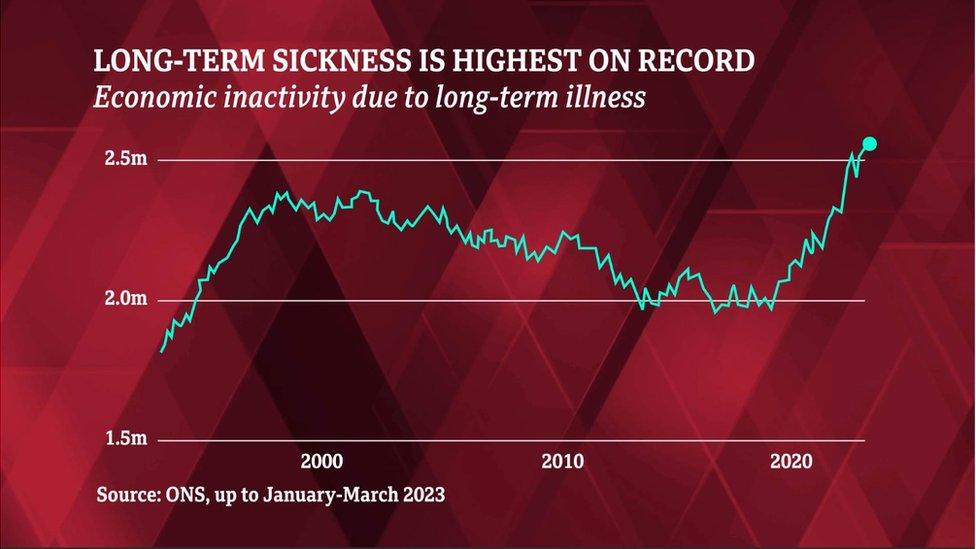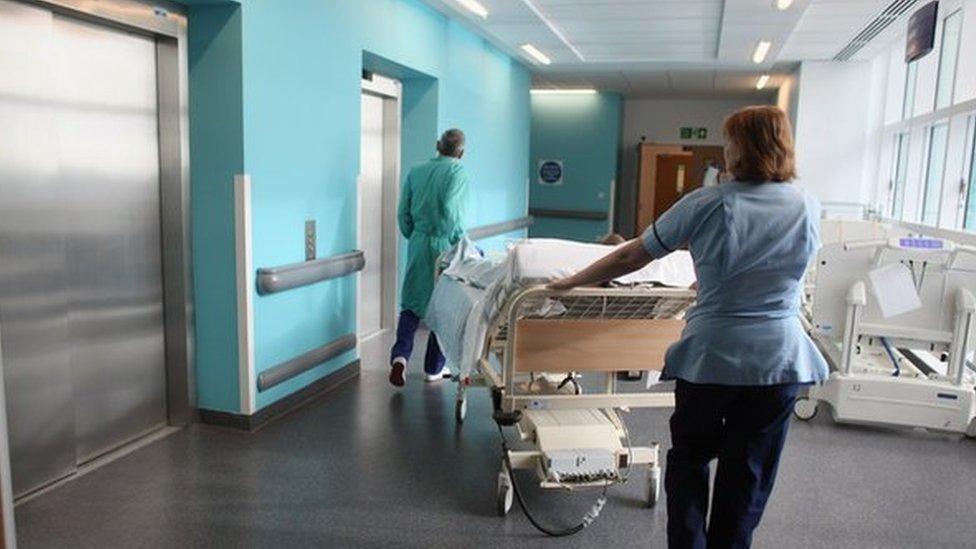Employment: People on long-term sick feel 'written off'
- Published

As well as rising numbers of post-Covid illnesses, those suffering from mental health and back issues account for many on long-term sick
"Written off" and "ashamed" - this is how one woman described the experience of being on long-term sick leave.
Emma - not her real name - from north Wales, said she wanted to return to work but had lost her self-esteem and confidence.
It comes as official data shows those not working due to long-term sickness remain at record levels, external in the UK.
The Welsh government said it was working to help people with ill health back into employment.
Emma has been away from her healthcare role since contracting Covid and said she felt ashamed about not being able to return to her job.
She said: "I feel written off. I feel a lot of it was blamed on mental health."I was told that I should be mindful and getting out in the fresh air, which felt very patronising."
Emma said she believed that if her employer were to make some changes, she would be able to return to her role.
"I was told I'd need to complete a high number of hours on my first week of return - not all illnesses can accommodate strict policy," she said.

Nicola Allen has recently returned to work with a friend's company
Nicola Allen from Whitchurch, Cardiff, started experiencing health issues during pregnancy and was later diagnosed with fibromyalgia, external and chronic fatigue syndrome, external.
"I always had the plan that I would return to work when my son was in school full-time, but that didn't happen," she said.
"I felt completely lost, I was grieving my life."
Nicola had worked in London for many years as an assistant buyer for a popular high street clothes shop.
After about eight years out of work, Nicola was recently offered a part-time employment opportunity through a friend's company.
She said: "My previous career was demanding so I was nervous, but they were clear they wanted me, as me - and they understood my conditions.
"I even told them I was frightened, because I didn't want to let them down, or myself down."
The support Nicola is given means she can manage her health as and when she needs to.
She said she felt more confident as a result.
"Long-term sick doesn't mean we don't want to work, we do - we're just unfortunately not being given the opportunities that work with our illnesses," she said.

About 2.5 million people in the UK are not working due to health problems, the Office for National Statistics said.
It said an increase in mental health issues and people suffering back pain, possibly due to home working, were the main causes of the rise.
Typically, for every 13 people currently working, one person is long-term sick.
"Figures had started going up before the pandemic but that trend continued into the pandemic and accelerated in 2021 to reach a record high," said David Freeman, head of labour markets and household at the Office of National Statistics.
He said there had been a change in types of illnesses - including post-viral fatigue "which could be linked to long-Covid". He also described rising cases of people affected by back and mental health issues.
Head of Wales at Federation of Small Businesses, Ben Cottam, said: "Illness costs businesses financially across the UK £5 billion a year, so there is a definite economic impact, which is why we'd like to see government-targeted intervention."
In a statement, the Welsh government said: "We are working to help people suffering with ill-health back into work. Our plan for employability and skills prioritises people most in need of help.
"This includes supporting people to stay in work and those further away from the labour market to find employment.
"Furthermore, in February 2023, we announced the Out of Work Service to support 10,500 people recovering from mental ill-health and/ or substance misuse into education, training or work by March 2025."
The Department for Work and Pensions said: "We know for many people there are significant benefits to being in work, including for their wellbeing. We're investing £3.5 billion to help millions, including those with long-term illness, to start, stay and succeed in work.
"Our plan is working - inactivity in Wales has fallen since last quarter - but for those who can't return to work yet, employers can choose to pay more occupational sick pay for longer, while Universal Credit provides a strong financial safety net for those needing extra support."
Related topics
- Published21 May 2023

- Published16 May 2023
